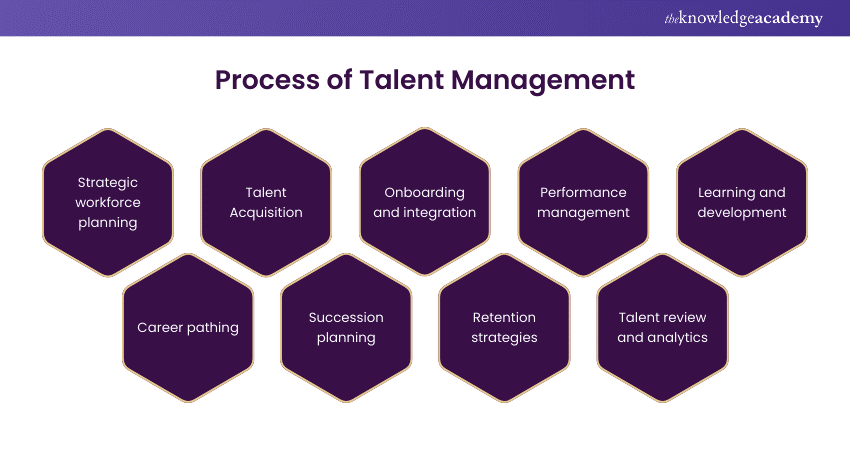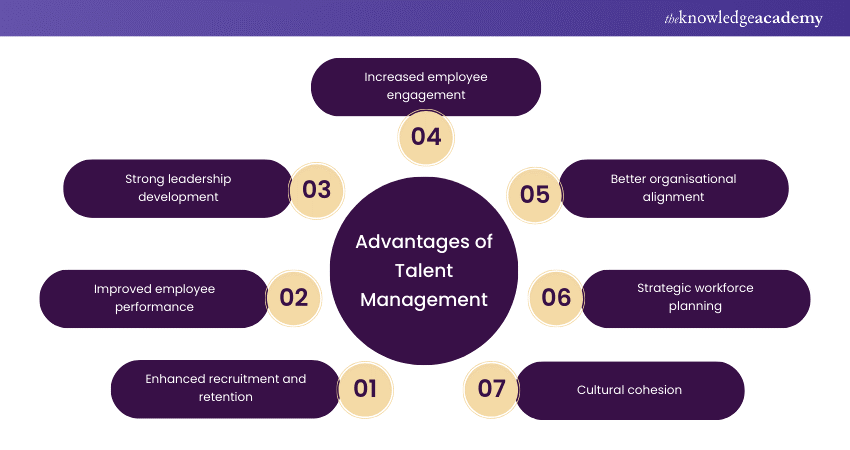We may not have the course you’re looking for. If you enquire or give us a call on 01344203999 and speak to our training experts, we may still be able to help with your training requirements.
Training Outcomes Within Your Budget!
We ensure quality, budget-alignment, and timely delivery by our expert instructors.

If you wish to pursue a career in Human Resource Management or Talent Acquisition, it is necessary to know that Talent Management is often a significant component of HR. But if you need help understanding What is Talent Management, you are in the right place.
Just as a gardener plants seeds, nurtures them, and watches them bloom, Talent Management involves scouting for bright individuals, giving them reasons to stick around, and providing opportunities for them to flourish in roles that suit them today and in the future. It’s a key piece of the HR puzzle, ensuring your company stays strong and vibrant with a team that’s ready to tackle today’s tasks and tomorrow’s challenges.
The focus is on designing organisational effectiveness to deliver improved performance and achieve strategic and operational objectives. If you want to know more about Talent Management, read this blog further!
Table of Contents
1) What is Talent Management?
2) Process of Talent Management
3) Strategies of Talent Management
4) Advantages of Talent Management
5) Example of Talent Management
6) Conclusion
What is Talent Management?
Talent Management is the systematic process organisations use to identify, recruit, retain, and develop the most talented and superior employees available in the job market. It encompasses integrated activities to ensure the company has a continuous supply of highly productive individuals in the correct positions. This approach focuses not only on current employees but also on future hiring needs to achieve business goals.
Key components include career development, succession planning, employee training, and performance management. Talent Management aims to create a motivated workforce with the skills and attributes necessary to drive organisational success and innovation.
Process of Talent Management
The process of Talent Management involves several key steps, each designed to optimise the workforce's contribution to organisational goals. Here's an overview in bullet points:

a) Strategic workforce planning: Identifying current and future talent needs based on business objectives.
b) Talent Acquisition: Attracting and recruiting talent through effective sourcing strategies, employer branding, and selection processes.
c) Onboarding and integration: Ensuring new hires are effectively integrated into the organisation and have a clear understanding of their roles, expectations, and company culture.
d) Performance management: Continuously assessing and managing employee performance through feedback, goal setting, and regular reviews.
e) Learning and development: Providing training and development opportunities to enhance skills, foster growth, and prepare employees for future roles.
f) Career pathing: Offering clear career progression opportunities to motivate and retain talent by aligning individual aspirations with organisational needs.
g) Succession planning: Identifying and preparing potential leaders to fill critical positions, ensuring business continuity.
h) Retention strategies: Implementing initiatives to retain top talent, such as competitive compensation, recognition programs, and work-life balance options.
i) Talent review and analytics: Regularly review Talent Management processes and use HR analytics to make data-driven decisions for improvement.
Learn more about Human Resources today with our Introduction to HR Course! Register now!
Strategies of Talent Management
Talent Management has evolved to be one of the critical factors of organisational success. It entails recruiting the right staff and training and developing them to complement the organisation’s mission and vision. Some key strategies that can be applied to improve organisational Talent Management processes include.
1) Comprehensive job descriptions
The first approach to attracting talent is the creation of comprehensive job descriptions. These descriptions should outline duties and requirements and include information about the nature of the work environment, what is expected of the employee, the outcomes of the role, and how the role contributes to organisational goals.
This clarity attracts candidates who understand the nature of the job in question and the potential it holds enough to motivate them, hence attracting the right candidate.
2) Aligning people with organisational values
Linking employees’ cultural beliefs into organisational culture. The alignment of the employees’ value system and the organisational culture is essential in retaining the employees and increasing their productivity.
This strategy includes using the organisation’s mission, vision, and values to search for employees whose personal values align with theirs. Such alignment generates a feeling of ownership and meaning that encourages employees to adopt the best attitude.
3) Foster collaboration, coaching, and evolution
A new workplace requires people to work together and learn from each other. Employees must work in teams, asking for feedback from colleagues and advising coworkers to strengthen collective intelligence and creativity.
Moreover, emphasising career evolution within the organisation, including lateral moves and role diversification, supports personal growth and organisational resilience.
4) Recognise and reward appropriately
Reward systems and recognition are advantageous in making employees feel valued. It is also crucial to recognise employees with different intangible markers and provide them with a broad range of reward schemes rather than only financial ones.
It is also crucial to know each employee's preferences regarding rewards such as public kudos, professional training, and flexible working hours.
5) Encourage continuous improvement opportunities
Organisations that aspire to improve continuously offer their employees lifetime personal and professional growth. This could be through a formal training curriculum or simply practising the skills on the job with a senior board member.
Training to promote these opportunities provides an avenue for skilled employees. It indicates the organisation’s commitment to their career growth, which in turn enhances the workers’ commitment and the attrition rate within the organisation.
Enhance the culture of your company with our HR Courses – join now!
Advantages of Talent Management
Talent Management offers many advantages for organisations aiming to navigate the complexities of the modern business landscape. Here are the key benefits:

a) Enhanced recruitment and retention: Talent Management consists of connecting organisational goals to Talent Management to increase and maintain a properly skilled workforce, attract and retain talented employees, and decrease turnover and costs.
b) Improved employee performance: The strategic approach to the employee’s skills and interests can be effective in making sure that the employees are in the right place and get the proper reward for their work, hence, higher job satisfaction and productivity.
c) Strong leadership development: Talent Management acts as a preparation strategy, where the organisation aims to develop competent internal talent who may rise to take on leadership abilities, reducing the demand for external talent.
d) Increased employee engagement: Reward and recognition programs and professional development initiatives within the scope of Talent Management positively foster employee commitment.
e) Better organisational alignment: Performance management helps to ensure that all employees work towards the same organisational developments and achieve overall organisational strategic goals in an effective and timely manner.
f) Strategic workforce planning: Talent Management is the precondition for anticipating skill requirements before making it to the market.
g) Cultural cohesion: Talent Management helps build a cohesive corporate culture by achieving an organisational identity that attracts and retains people whose values and interests are congruent with the organisation’s.
Learn how to use strategies for your operational success with our Recruiting for Success Training – sign up now!
Example of Talent Management
An exemplary case of Talent Management can be observed in Google's approach to nurturing and retaining its workforce. Google, recognised globally for its innovative practices in Talent Management, has effectively demonstrated how a company can achieve remarkable success by prioritising its employees. This approach involves a series of strategic actions designed to attract, develop, and retain the best talent in the industry.
a) Attracting talent:
Google's Talent Acquisition strategy is highly selective, focusing on not only the technical skills of the candidates but also their ability to contribute to Google's culture of innovation. They have a thorough interview process that digs into how you solve problems, lead, and fit into what they call “Googleyness” — that special mix of qualities that makes someone a great Googler. Google's employer brand, renowned for its work environment, cutting-edge projects, and benefits, attracts a vast pool of applicants.
b) Onboarding and integration:
Once hired, new Googlers, or "Nooglers," undergo an onboarding process meticulously designed to acclimate them to Google's culture and operations. This includes orientation sessions, mentorship programs, and immersion into Google's collaborative work environment. The aim is to make Nooglers feel welcome and to equip them with the knowledge and networks they need to succeed.
c) Performance management and development:
Google has revolutionised performance management by implementing a transparent and data-driven process. The company uses Objectives and Key Results (OKRs) to set and communicate goals at all levels, encouraging employees to set ambitious targets and track their progress. Furthermore, Google invests heavily in employee development through continuous learning opportunities, including workshops, courses, and on-the-job training, to help employees expand their skills and advance their careers.
d) Fostering innovation and collaboration:
Google's Talent Management strategy strongly emphasises innovation and collaboration. Employees are encouraged to spend 20% of their time on passion projects that interest them, which has led to successful products like Gmail and AdSense. This freedom stimulates creativity and innovation, while open office spaces and team-based projects promote collaboration and knowledge sharing.
e) Recognition and rewards:
Recognising and rewarding employees' contributions is critical to Google's Talent Management. The company offers competitive salaries, bonuses, and stock options. Additionally, it provides unique benefits and perks, such as wellness programs, on-site childcare, and flexible work arrangements, which contribute to high employee satisfaction and retention rates.
f) Leadership development and succession planning:
Google strongly emphasises developing future leaders from within its ranks. Through leadership development programs and mentoring, employees are prepared for higher responsibilities. Succession planning ensures that there is always a pipeline of talent ready to step into critical roles, ensuring the company's resilience and continuity.
g) Diversity and inclusion:
An integral part of Google's Talent Management is its commitment to diversity and inclusion. By fostering a diverse workforce and inclusive culture, Google enhances its innovation capacity and reflects the global user base it serves. This is achieved through targeted recruitment efforts, diversity training programs, and employee resource groups.
Do you want to learn more about how to set the conduct guidelines? Register now for our Ethics in Workplace Training!
Conclusion
We hope that from this blog, you have understood What is Talent Management and how it plays an integral role in every organisation. We have also discussed in this blog how effective Talent Management is in creating an environment where employees feel valued, engaged, and aligned with the organisation's goals.
Do you want to understand more about team ethics? Then join us now for our Team and Management Ethics Training!
Frequently Asked Questions

The following are four pillars of Talent Management:
1) Recruitment
2) Retention
3) Development
4) Engagement.

Talent Management principles involve the three C’s –
1) Competence
2) Commitment
3) Contribution

The Knowledge Academy takes global learning to new heights, offering over 30,000 online courses across 490+ locations in 220 countries. This expansive reach ensures accessibility and convenience for learners worldwide.
Alongside our diverse Online Course Catalogue, encompassing 17 major categories, we go the extra mile by providing a plethora of free educational Online Resources like News updates, Blogs, videos, webinars, and interview questions. Tailoring learning experiences further, professionals can maximise value with customisable Course Bundles of TKA.

The Knowledge Academy’s Knowledge Pass, a prepaid voucher, adds another layer of flexibility, allowing course bookings over a 12-month period. Join us on a journey where education knows no bounds.

The Knowledge Academy offers various HR Courses, including Certified HR Advisor, Certified HR Manager, and Certified Training and Development Manager. These courses cater to different skill levels, providing comprehensive insights into Human Resource Management methodologies.
Our Business Skills blogs covers a range of topics related to Talent Acquisition, offering valuable resources, best practices, and industry insights. Whether you are a beginner or looking to advance your Human Resource skills, The Knowledge Academy's diverse courses and informative blogs have you covered.







 Top Rated Course
Top Rated Course




 If you wish to make any changes to your course, please
If you wish to make any changes to your course, please


